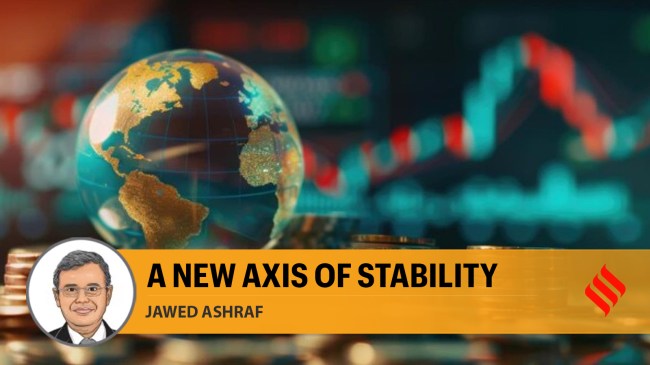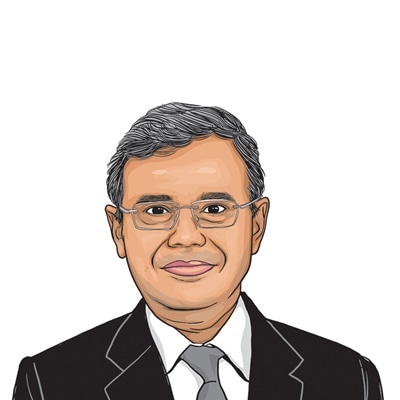Opinion Jawed Ashraf writes: India and Europe can anchor a multipolar world
The EU must conclude the EU-India trade and investment agreements quickly and also waive CBAM for India.
 Great powers believe they can bend the world to their will but often cause chaos. Middle powers need to leverage partnerships and institutions to resist and maximise their roles.
Great powers believe they can bend the world to their will but often cause chaos. Middle powers need to leverage partnerships and institutions to resist and maximise their roles. External Affairs Minister S Jaishankar’s second visit to Europe within a month reflects a deepening India-Europe engagement even as the two sides deal with volatile US policies, era-shaping geopolitical shifts, terrorism from Pakistan and escalating conflict in Europe. Highlights include Prime Minister Narendra Modi’s visit to France to co-chair the AI Action Summit and the visit by the re-elected European Commission President, Ursula Von der Leyen, and the college of commissioners to India in February. The MEA-supported Raisina Dialogue also makes a debut this week in the strategic port city of Marseille.
 Europe faces extraordinary challenges. War has returned. Economic difficulties, concerns over security and immigration, and rising issues of identity and culture are reshaping politics. The European Union’s (EU’s) many internal stresses and faultlines have made managing the European project more complex, though Brexit has dissuaded even the most nationalist governments from abandoning the EU.
Europe faces extraordinary challenges. War has returned. Economic difficulties, concerns over security and immigration, and rising issues of identity and culture are reshaping politics. The European Union’s (EU’s) many internal stresses and faultlines have made managing the European project more complex, though Brexit has dissuaded even the most nationalist governments from abandoning the EU.The external challenges are greater. Europe must contend with US President Donald Trump’s disdain for NATO and near dismantling of long-adrift transatlantic relations, the rupture in relations with Russia, and the geopolitical and economic strain in ties with China. Multilateralism, Europe’s refuge for order and its instrument of international influence, is crumbling. Europe risks strategic irrelevance and a rising gap with the US and China in innovation and competitiveness. The world’s most open major economy faces an upturned global trade regime. And, as it happens in continental landmasses, to Europe’s east, the lines that define the political and cultural geography of what constitutes Europe are perennially contested.
But the EU has shown remarkable cohesion and resilience in its response to Covid, the Ukraine war and Trump’s onslaught. Its project of horizontal and vertical integration continues. Relations with the UK are improving. Europe is waking up to the need for independence in foreign and security policy, the pursuit of industrial and digital sovereignty, a resilient internal supply chain and a stronger defence industrial base. It has the intellectual, industrial and investment capacity for that. But Europe cannot do it by itself. It needs new patterns of alignment. Equally, global uncertainty has reinforced India’s traditional proclivity for a diversified portfolio of partnerships.
Engagement with Europe involves two levels. With the EU in its areas of exclusive and shared competences, there is a long tradition of summits, and now, expansion of strategic dialogues, including in trade, technology, security and foreign policy. With older and major member states, ties are strengthening and acquiring new dimensions. The Nordic region is the new frontier and attention has returned to the dynamic east.
The EU is a leading and growing trade and investment partner for India. According to a Institut Montaigne study on the EU’s ties in the Indo-Pacific, Eurostat data shows that between 2015 and 2022, EU27 FDI stock registered the strongest growth in India at 96 per cent, exceeding Taiwan’s 93 per cent and China’s 52 per cent. From France alone, the FDI stock grew a whopping 373 per cent. In trade, too, between 2015 and 2023, EU27 exports to India grew 47 per cent, behind 83 per cent to Taiwan and 54 per cent to China. EU imports from India grew by over 100 per cent, second behind Taiwan from the Indo-Pacific. Surveys indicate a trend toward diversification away from China, though less than that of US companies.
The EU must conclude the EU-India trade and investment agreements quickly, starting with an early harvest, and also waive the Carbon Border Adjustment Mechanism for India in view of India’s progress in green energy. These will accelerate IMEC, the great new strategic initiative that reprises an old India-Europe corridor, and will survive the current instability in the Middle East. It aims to be not just a trade route but a new global corridor of investment, innovation, enterprise and energy. India must invest more in Europe.
India and Europe converge on the public character and purpose of digital technology and in preventing a global duopoly. As Modi said at the AI Action Summit, we can collaborate in innovation, application, regulation, governance, standards and serving public good globally. That also applies to digital public infrastructure. India can benefit from Europe’s leadership in deeptech, digital manufacturing, enterprise technologies and key areas of the semiconductor chain.
Indeed, science, technology and innovation should drive our partnership — to lead industries of the future and address global priorities, including diverse clean energy sources, climate resilience, health and food security, biodiversity and the sustainability of Earth and its oceans. This also requires a comprehensive mobility programme of higher ambition for students, scholars and scientists.
Europe is a significant source of armaments for India. Europe, seeking to rearm itself, and India pursuing atmanirbharta, must prioritise collaboration and full transfer of technology in joint design, development and manufacturing of defence equipment. We have robust cooperation in the areas of maritime, underwater, space and cyber security, as also in counter-terrorism with many European partners. Beyond technical and intelligence cooperation, Europe, hit by Islamist terrorism, and sometimes with the provenance of Pakistan, needs to do more to penalise Pakistan for terrorism.
Great powers believe they can bend the world to their will but often cause chaos. Middle powers need to leverage partnerships and institutions to resist and maximise their roles. India and the EU have a broader global agenda that rises beyond differences on Ukraine or Pakistan. India and a united, cohesive Europe, with an independent voice and capabilities, can build a stable multipolar world, anchored in international law, underpinned by the discipline of multilateralism and free from territorial ambitions.
India and Europe approach challenges through coalitions, not unilateral initiatives or the use of asymmetric bilateral power. That calls for collaboration, not the EU’s prescriptive approach on its norms. For the Global South, partnerships can protect our interests against mounting competition and also mitigate global fragmentation. In the Indo-Pacific region, while France is a key security partner for India, working with others and the EU, India can help countries avoid coercion by one hegemon or a forced choice between two major powers.
Attention and time, imagination and ambition, and sensitivity to each other’s concerns transform relationships. Europe and India need more of that despite other immediate preoccupations in Brussels, Delhi and European capitals. We must involve all stakeholders and also reshape media stereotypes and public perceptions.
The author is a retired Indian ambassador






